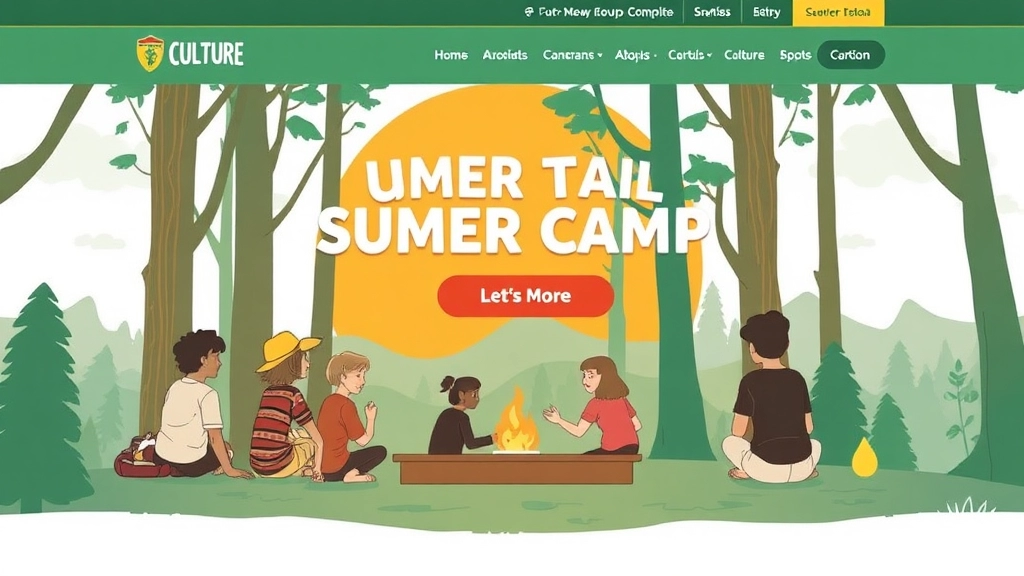Understanding the Magic of Summer Camps
Are you curious about the magic behind summer camps and why they hold a special place in so many hearts? In this article, we unravel the essence of summer camp culture, exploring its rich traditions, key elements, and the popular activities that make it an unforgettable experience. From the pivotal role of camp counselors to the lifelong friendships forged, we delve into how these camps contribute to personal growth and development.
The Importance of Diversity and Inclusion
We’ll also touch on the importance of diversity and inclusion, guiding you on how to choose the right summer camp for your child. As we trace the evolution of summer camps over time, you’ll gain insights into what makes these experiences so impactful.
Practical Tips for a Successful Summer Camp Adventure
Finally, we offer practical tips for ensuring a successful summer camp adventure, making this your ultimate guide to understanding and appreciating the vibrant world of summer camps.
Exploring Summer Camp Traditions
Ever wondered why summer camps are such a big deal? What makes them a rite of passage for so many kids? Let’s dive into the traditions that make summer camps a memorable experience for all.
What Are Summer Camp Traditions?
Summer camp traditions are the glue that holds the camp community together. They’re the activities, rituals, and events that happen year after year, creating a sense of continuity and belonging. Think of it like the secret sauce that makes the summer camp experience unique and unforgettable.
Why Do Traditions Matter?
Traditions give kids something to look forward to. They create a sense of stability and familiarity in an otherwise new and sometimes intimidating environment. Plus, they’re just plain fun! Here are a few key reasons why traditions are essential:
- Building Community: Traditions bring everyone together, creating a strong sense of community.
- Creating Memories: These rituals are often the moments kids remember most.
- Instilling Values: Many traditions are designed to teach important life lessons.
Common Traditions You’ll Find
Alright, let’s get into some specifics. Here are a few classic summer camp traditions that you’re likely to encounter:
- Campfire Nights: Gather around the campfire for stories, songs, and s’mores. It’s a time for bonding and reflection.
- Color Wars: A friendly competition where the camp is divided into teams. Activities range from sports to scavenger hunts.
- Talent Shows: A chance for kids to showcase their unique skills, whether it’s singing, dancing, or magic tricks.
- Theme Days: From pirate day to superhero day, these themed events break up the routine and add a layer of excitement.
- Flag Ceremonies: Often held at the start and end of the day, these ceremonies instill a sense of respect and unity.
My Personal Favourite: The Campfire Night
I remember my first campfire night like it was yesterday. The crackling fire, the starry sky, and the feeling of being part of something bigger. It’s those moments that stick with you, shaping your love for the outdoors and camaraderie.
Why These Traditions Work
The beauty of summer camp traditions is that they’re simple yet powerful. They don’t require fancy equipment or elaborate planning. What they do require is a sense of community and a willingness to participate. Here’s why they work so well:
- Inclusivity: Everyone can join in, regardless of skill level or background.
- Repetition: Doing the same activities year after year creates a sense of belonging.
- Fun Factor: Let’s face it, these traditions are just plain fun!
Final Thoughts
Exploring summer camp traditions is like peeling back the layers of an onion. Each tradition adds a new dimension to the camp experience, making it richer and more meaningful. So, whether you’re a parent considering sending your child to camp or a camper yourself, these traditions are what make summer camp a truly magical experience.
If you’re interested in a camp that offers a variety of fun and safe programs, check out ZKids Summer Camp. For those who love sports, the Loyola Academy Summer Sports Camp is a fantastic option.
Key Elements of Summer Camp Culture
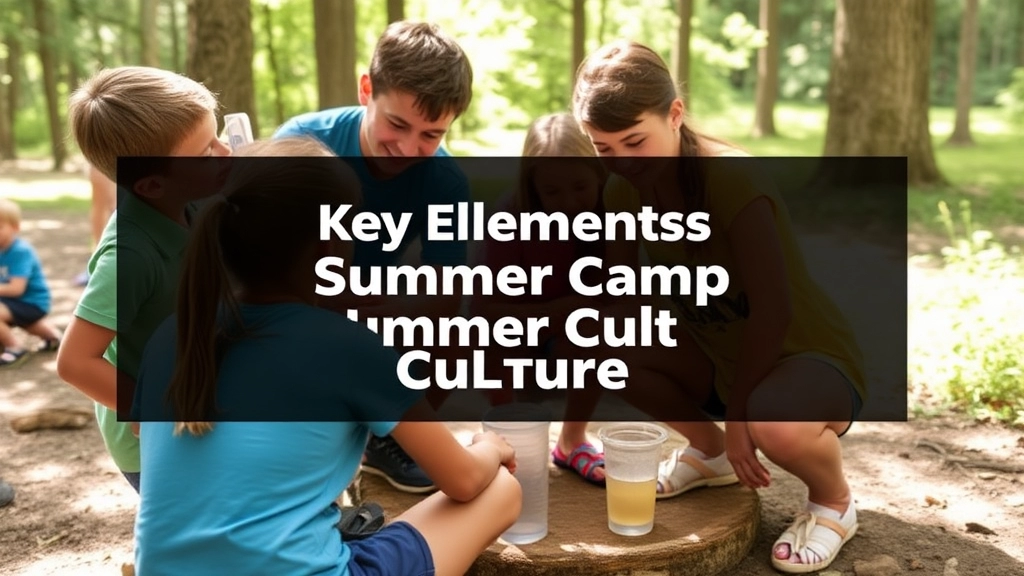
Ever wondered what makes summer camp so special?
Why do kids and teens rave about it long after they’ve returned home?
It’s all about the culture.
The Campfire Tradition
Let’s start with the classic campfire.
Picture this: everyone gathered around, sharing stories, singing songs, and roasting marshmallows.
It’s a bonding experience that’s hard to beat.
Cabin Life
Living in cabins with a bunch of peers?
That’s where friendships are forged.
You learn to share space, respect each other’s quirks, and work as a team.
It’s like a crash course in social skills.
Camp Songs and Cheers
Ever heard a camp song?
They’re catchy, fun, and often a bit silly.
But they bring everyone together.
When you hear that familiar tune, you know you’re part of something bigger.
Rituals and Traditions
Each camp has its own unique rituals.
Maybe it’s a special flag-raising ceremony.
Or a quirky talent show that everyone looks forward to.
These traditions create a sense of belonging and continuity.
Unplugging from Tech
One of the biggest elements?
No screens.
Kids get to disconnect from their devices and reconnect with nature and people.
It’s refreshing and often eye-opening.
Inclusivity and Acceptance
Summer camps are melting pots of diverse backgrounds.
Kids learn to appreciate differences and build inclusive communities.
It’s a mini-lesson in real-world diversity.
Leadership and Responsibility
From daily chores to leading activities, campers take on roles that build leadership skills.
It’s about stepping up and taking responsibility.
Nature Immersion
Let’s not forget the great outdoors.
Whether it’s hiking, swimming, or just exploring, nature plays a huge role in camp culture.
It’s a break from the usual urban hustle.
Lifelong Memories
All these elements combine to create unforgettable experiences.
Ask any former camper, and they’ll have stories to tell.
Summer camp culture is rich, diverse, and impactful.
Popular Activities and Programs
Alright, let’s dive into the meat of summer camps â the activities and programs. What’s the deal with these? Why do kids and parents rave about them? Well, let me break it down for you.
The Classic Campfire
Who doesn’t love a good campfire? It’s not just about roasting marshmallows (though that’s a big win). It’s about the stories, the songs, and the sense of community. Kids gather around, share tales, and bond over the flickering flames. It’s a tradition that never gets old.
Water Sports Galore
If your kid’s into splashing around, summer camps have got them covered. From canoeing and kayaking to swimming and paddleboarding, water sports are a staple. They’re not just fun; they teach teamwork, coordination, and even a bit of bravery.
Adventure and Exploration
Think hiking, orienteering, and nature walks. Camps often have vast grounds to explore. Kids learn to navigate, identify plants and animals, and appreciate the great outdoors. It’s like a real-life treasure hunt, and who doesn’t love that? For those who love nature, exploring bucolic summer camps offers a thrilling adventure.
Creative Arts and Crafts
Not every kid wants to be Tarzan. For the budding artists, camps offer a plethora of arts and crafts activities. Painting, pottery, and even drama workshops. It’s a chance for kids to express themselves and maybe discover a hidden talent.
Sports and Games
From football and basketball to archery and rock climbing, sports are a huge part of camp life. They keep kids active, teach them about competition and fair play, and, most importantly, they’re a blast. Check out the top summer sports camps in Jacksonville, FL for some exciting options.
Specialised Programs
Some camps go the extra mile with specialised programs. Think robotics, coding, or even culinary camps. These are perfect for kids with specific interests and can be a great way to learn new skills in a fun environment.
Leadership and Team-Building
Many camps incorporate activities that focus on leadership and teamwork. Whether it’s through group challenges, trust exercises, or team sports, kids learn the value of working together and leading with confidence.
Real Stories, Real Impact
I remember talking to a parent whose child attended a summer camp with a strong focus on environmental conservation. The kid came back home not just with a tan but with a newfound passion for protecting the planet. They started a recycling program at their school and even got their family involved. That’s the kind of impact these activities can have.
Why These Activities Matter
So, why do these activities and programs matter? Here’s the deal:
The Role of Camp Counselors
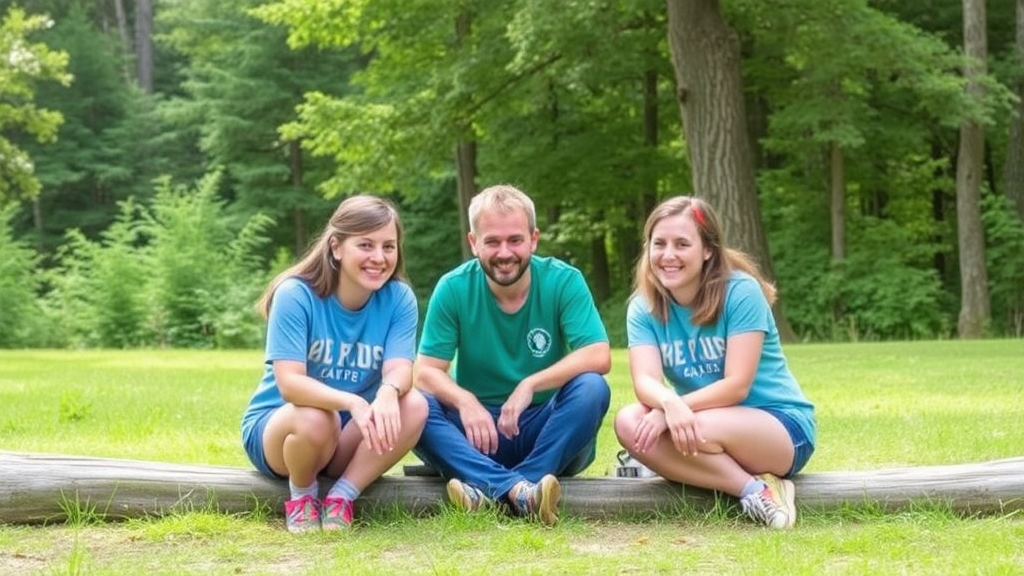
Ever wondered what makes a summer camp truly unforgettable?
It’s the camp counselors.
They’re the heart and soul of the whole experience.
But what exactly do they do?
What Makes a Great Camp Counselor?
First off, camp counselors are like the Swiss Army knives of the camp world.
They do everything.
From organising activities to being a shoulder to cry on.
Here’s what you need to know:
- Leadership: They guide kids through daily routines and activities.
- Safety: They ensure everyone is safe, both physically and emotionally.
- Role Models: They set a good example, showing kids how to treat others with respect.
- Problem Solvers: They handle conflicts and issues that arise.
Why Are They So Important?
Think about it.
Kids are away from home, often for the first time.
They need someone they can trust.
Someone who’s got their back.
That’s where counselors come in.
They create a safe, fun environment where kids can thrive.
Real Stories, Real Impact
I remember my first summer camp.
I was nervous, didn’t know anyone.
But my counselor, Sarah, made all the difference.
She made me feel included, taught me how to canoe, and even helped me make my first campfire.
By the end of the week, I didn’t want to leave.
The Skills They Bring
Counselors aren’t just random people.
They’re trained.
Here’s a quick rundown:
- First Aid: They know how to handle emergencies.
- Activity Planning: They organise games, crafts, and adventures.
- Conflict Resolution: They mediate disputes between campers.
- Emotional Support: They provide a listening ear and advice.
How They Shape the Camp Culture
Counselors set the tone.
They create the camp’s vibe.
Their enthusiasm is contagious.
When they’re excited about an activity, the kids get excited too.
They’re the glue that holds everything together.
Choosing the Right Camp with Great Counselors
When picking a summer camp, look at the staff.
Do they have experience?
Are they trained?
Great counselors can turn a good camp into an amazing one.
Building Lifelong Friendships at Summer Camp
Ever wondered how summer camp friendships turn into lifelong bonds? It’s a real thing, and if you’re like me, you might be curious about how it all works. Let’s dive into this.
Why Do Camp Friendships Last?
Shared Experiences: When you’re at camp, you’re not just hanging out; you’re navigating challenges, laughing over silly games, and maybe even facing fears together. These shared experiences create a strong bond.
No Distractions: Unlike school, there’s no social media or homework at camp. It’s just you and your mates, living in the moment.
Diverse Connections: Camps bring together kids from all walks of life. This diversity enriches friendships and broadens perspectives.
How Camp Friendships Form
- Team Activities: Whether it’s a tug-of-war or a group art project, working together builds camaraderie.
- Campfire Chats: Late-night talks around the campfire often lead to deep connections.
- Shared Cabins: Living in close quarters means you really get to know each other, quirks and all.
Real Stories of Camp Friendships
I remember my first camp. I was nervous, didn’t know a soul. But by the end of the week, I had a group of friends who felt like family. We still catch up, years later. That’s the magic of camp.
Tips for Building Friendships at Camp
- Be Open: Don’t be afraid to introduce yourself and join in activities.
- Stay Positive: A good attitude goes a long way in forming connections.
- Be Yourself: Authenticity attracts genuine friendships.
The Impact of Camp Friendships
These friendships often extend beyond camp, turning into lifelong connections. They can lead to:
- Networking Opportunities: You never know when a camp friend might help you out in the future.
- Support Systems: Lifelong friends are there for you, through thick and thin.
Friendship is the heart of the camp experience. Don’t miss out on this incredible opportunity for growth and connection.
Impact on Personal Growth and Development
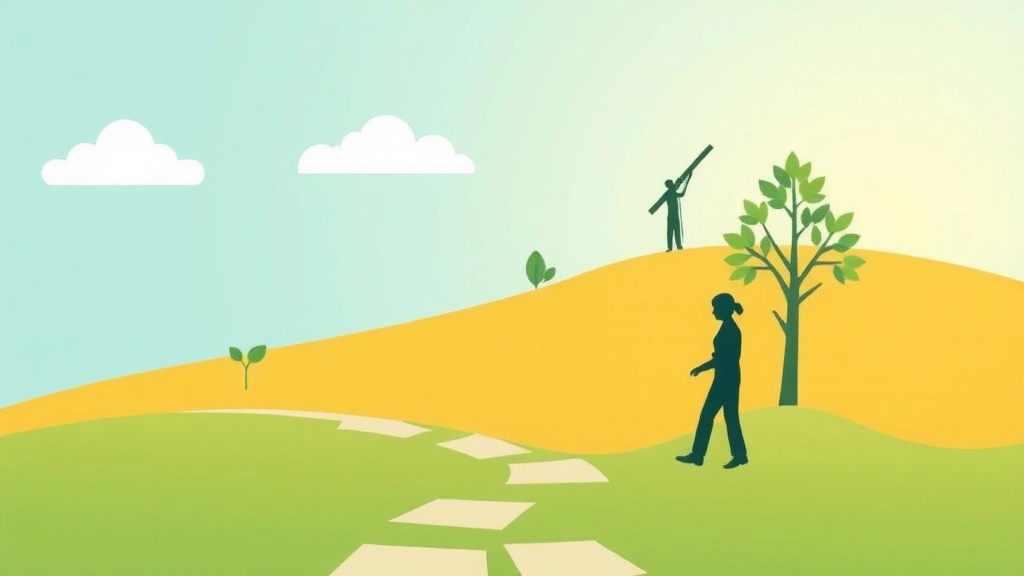
Ever wonder how summer camps shape our kids’ lives?
It’s not just about fun and games. Summer camps are like a secret sauce for personal growth and development.
Why?
Because they push kids out of their comfort zones. They face new challenges, make decisions, and learn to be independent.
Real talk:
- Confidence Boost: Tackling activities like rock climbing or performing in a camp play builds confidence. Kids realise they can do more than they thought.
- Resilience: Not everything goes as planned. Maybe it rains on a hiking day or they lose a game. Learning to bounce back is a massive life skill.
- Social Skills: Living with a bunch of peers teaches kids how to communicate, resolve conflicts, and build relationships. It’s like a crash course in social dynamics.
Let’s break it down:
- Teamwork: Camps often involve group activities. Working as a team to achieve a common goal is a core part of the experience.
- Leadership: Older kids or those with more experience often take on leadership roles, guiding and helping younger campers.
- Problem-Solving: Whether it’s figuring out the best way to build a campfire or navigating a map, problem-solving skills are constantly being honed.
Example Time:
I remember a camper named Sam. He was shy and reserved at first. But after a few weeks, he was leading his team in scavenger hunts and even performed a solo in the camp talent show. His transformation was incredible.
Bottom line:
Summer camps are more than just a way to keep kids busy during the holidays. They’re a powerful tool for personal growth and development.
Ready to dive deeper?
Check out our section on Choosing the Right Summer Camp for Your Child to find the perfect fit.
Diversity and Inclusion in Summer Camps
Are you worried about whether your child will feel included and accepted at summer camp? You’re not alone. Many parents share this concern, especially in today’s diverse world. So, let’s break it down and see how summer camps are stepping up to the plate when it comes to diversity and inclusion.
Why Diversity and Inclusion Matter
First off, diversity and inclusion aren’t just buzzwords. They shape the very fabric of a positive camp experience. When kids see themselves represented and feel valued, they thrive. Not to mention, they learn to appreciate differences, which is a life skill that will serve them well beyond the campgrounds.
How Camps Are Making a Difference
So, how are camps actually doing this? Let’s get into specifics:
- Diverse Staff: Camps are hiring staff from various backgrounds to ensure kids see role models who look like them.
- Inclusive Activities: Activities are designed to be accessible to everyone, regardless of physical ability or cultural background.
- Cultural Celebrations: Some camps host events that celebrate different cultures, introducing campers to new traditions and perspectives.
- Anti-Bullying Policies: Zero tolerance for bullying ensures a safe space for all campers.
Real Stories, Real Impact
I remember a story from a camp director who shared how a young girl from a minority background felt isolated at first. But thanks to the camp’s inclusive environment, she not only made friends but also became a leader among her peers. This is the kind of impact we’re talking about.
Tips for Parents
If you’re still on the fence, here are some tips to ensure your child has an inclusive camp experience:
- Research: Look into camps that have a strong commitment to diversity and inclusion. Check their policies and reviews.
- Ask Questions: Don’t hesitate to ask camp directors about their approach to diversity and inclusion.
- Prepare Your Child: Talk to your child about what to expect and encourage them to be open-minded and inclusive.
Final Thoughts
Diversity and inclusion in summer camps aren’t just nice-to-haves; they’re essential. By choosing a camp that values these principles, you’re setting your child up for a memorable and enriching experience. Remember, the keyword here is diversity and inclusionâit’s the cornerstone of a great summer camp experience.
For more information on finding the right camp, check out our guide on finding the perfect fit for your child and explore the benefits of STEM summer camps.
Choosing the Right Summer Camp for Your Child
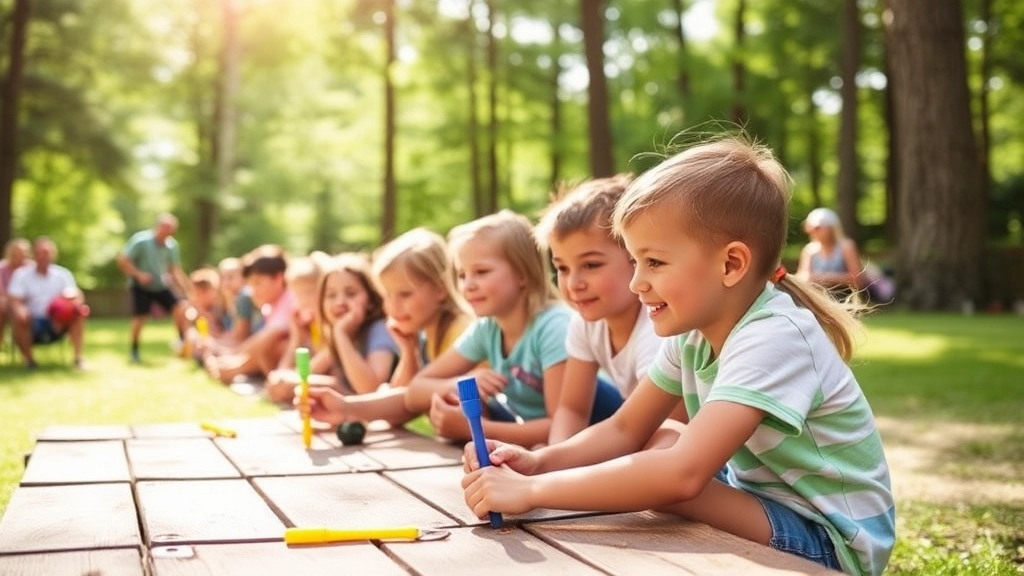
Are you feeling overwhelmed about picking the perfect summer camp for your child?
You’re not alone.
With so many options, it can feel like finding a needle in a haystack.
But don’t worry, I’ve got your back.
Let’s break it down step-by-step.
What Does Your Child Want?
First off, what are your child’s interests?
Do they love sports, arts, or science?
Ask them.
Their input is crucial.
Types of Camps
There are different types of camps:
- Day Camps: Great if you want your child home every night.
- Overnight Camps: Perfect for building independence.
- Specialty Camps: Focus on specific activities like coding, dance, or adventure.
Budget
Money matters.
Set a budget upfront.
Remember, pricier doesn’t always mean better.
Location
Consider the camp’s location.
Is it close to home?
Or are you okay with a bit of travel?
Safety First
Safety is non-negotiable.
Check the camp’s safety protocols.
Ask about their staff-to-child ratio.
Reviews and Recommendations
Talk to other parents.
Read online reviews.
Word of mouth can be gold.
Visit the Camp
If possible, visit the camp.
See it for yourself.
Meet the staff.
Feel the vibe.
Questions to Ask
When you visit or call, ask questions:
- What’s the daily schedule like?
- How are emergencies handled?
- What’s the camper-to-counselor ratio?
- Are the counselors trained?
Choosing the right summer camp doesn’t have to be stressful.
Just follow these steps, and you’ll find the perfect fit for your child.
The Evolution of Summer Camps Over Time
Ever wondered how summer camps went from simple outdoor getaways to the multifaceted experiences they are today? Let’s dive into the evolution of summer camps and see how they’ve transformed over the years.
The Early Days: Nature and Simplicity
Back in the day, summer camps were all about getting kids out into nature. Think rustic cabins, campfires, and a whole lot of hiking. The focus was on survival skills, teamwork, and learning to appreciate the great outdoors. It was simple, but it worked.
The Rise of Specialised Camps
As time went on, camps started to specialise. Parents wanted more than just a break from the city for their kids; they wanted skill-building opportunities. This is when we saw the rise of sports camps, music camps, and even science camps. These camps offered a chance to dive deep into specific interests, making the experience more enriching and targeted.
Technology’s Impact
Fast forward to the digital age, and technology has made its way into summer camps too. While the core values of outdoor activities and personal growth remain, many camps now incorporate tech elements. Think coding camps, robotics, and even virtual reality experiences. It’s a blend of the old and the new, aiming to prepare kids for a future that’s increasingly tech-driven.
Inclusive and Diverse Experiences
One of the most significant changes has been the push for diversity and inclusion. Modern camps are more aware of the need to be inclusive, offering programs that cater to kids from all backgrounds. This shift ensures that everyone gets a chance to enjoy the magic of summer camp, regardless of their race, gender, or socioeconomic status.
The Role of Camp Counselors
Camp counselors have always been the backbone of any camp, but their roles have evolved too. Nowadays, they are not just supervisors but mentors and role models. They undergo extensive training to handle everything from first aid to conflict resolution, ensuring a safe and supportive environment for all campers.
Adapting to Modern Needs
Today’s parents have different expectations and concerns. Safety is a big one, especially in a post-pandemic world. Camps have adapted by implementing stricter health protocols and offering flexible programs. Some camps even have mental health professionals on staff to support kids who might be struggling.
The Future of Summer Camps
Looking ahead, summer camps will likely continue to evolve. We might see more hybrid models that combine traditional outdoor activities with cutting-edge tech programs. The focus will remain on personal growth, but the methods will keep changing to stay relevant.
Why This Evolution Matters
Understanding the evolution of summer camps helps us appreciate their value even more. It’s not just about fun and games; it’s about adapting to the times and meeting the needs of each new generation. So, when you’re choosing a camp for your child, remember that these changes are designed to offer the best possible experience.
Tips for a Successful Summer Camp Experience
Worried about sending your kid to summer camp?
You’re not alone.
Summer camp can be a game-changer, but let’s keep it real. It can also be nerve-wracking.
Here’s how to set your child up for a successful summer camp experience.
Preparation is Key
Preparation can make or break the experience.
- Pack Smart: Make a checklist. Essentials firstâclothes, toiletries, any medication.
- Label Everything: Trust me, kids lose stuff. Label it all.
- Practice Independence: Teach them basic tasks like tying shoes or managing personal hygiene.
Choose the Right Camp
Not all summer camps are created equal.
- Interests and Hobbies: Pick a camp that aligns with your child’s interests, like soccer camps or STEM programs.
- Day Camp vs. Overnight Camp: Know what your child is comfortable with.
- Visit the Camp: If possible, take a tour. Get a feel for the place.
Communication Plan
Setting up a communication plan can ease worries for both you and your child.
- Set Expectations: Let them know how often you’ll be in touch.
- Letters and Emails: Some camps allow emails; others are old-school with letters.
- Emergency Contact: Make sure your child knows who to contact in case of an emergency.
Encourage Social Skills
Social skills are crucial at camp.
- Role-Playing: Practice scenarios like making new friends or resolving conflicts.
- Positive Attitude: Encourage them to be open and friendly.
- Team Activities: Emphasize the importance of participating in group activities.
Health and Safety
Safety first, always.
- Medical Forms: Fill them out accurately.
- Allergies and Medications: Ensure the camp staff is fully informed.
- Safety Protocols: Teach your child basic safety rules.
Embrace the Experience
Summer camp is all about new experiences.
- Try New Things: Encourage your child to try new activities.
- Stay Positive: Remind them that it’s okay to feel homesick or nervous.
- Capture Memories: Pack a disposable camera or a journal for them to document their adventure.
Feedback Loop
After camp, sit down and talk.
Frequently Asked Questions (FAQs) About Summer Camp Culture
What makes summer camp culture unique?
Summer camp culture is unique due to its traditions, such as campfires, cabin life, camp songs, and various rituals. These elements foster a sense of community, inclusivity, and personal growth.
Why are campfires important in summer camp culture?
Campfires are a classic tradition where everyone gathers to share stories, sing songs, and roast marshmallows. It’s a bonding experience that creates unforgettable memories.
What is the significance of cabin life at camp?
Cabin life is crucial as it teaches kids to share space, respect others’ quirks, and work as a team. It’s a crash course in social skills and forming lasting friendships.
How do camp songs and cheers contribute to the camp experience?
Camp songs and cheers are catchy, fun, and often a bit silly. They bring everyone together and create a sense of belonging, making campers feel part of something bigger.
What are some common rituals and traditions at summer camps?
Each camp has its own unique rituals, such as flag-raising ceremonies or talent shows. These traditions create a sense of continuity and belonging among campers.
Why is unplugging from technology emphasized at camps?
Summer camps often encourage disconnecting from screens to help kids reconnect with nature and people. It offers a refreshing and eye-opening break from the digital world.
How do summer camps promote inclusivity and acceptance?
Summer camps are melting pots of diverse backgrounds. They teach kids to appreciate differences and build inclusive communities, offering a mini-lesson in real-world diversity.
What roles do campers take on to build leadership and responsibility?
Campers engage in daily chores and lead activities, which helps them develop leadership skills and take on responsibilities, fostering personal growth.
How does nature immersion benefit campers?
Nature plays a significant role at camps, whether through hiking, swimming, or exploring. It offers a break from urban hustle and helps campers connect with the great outdoors.
What impact do summer camps have on personal growth and development?
Summer camps push kids out of their comfort zones, helping them build confidence, resilience, social skills, teamwork, leadership, and problem-solving abilities.
What qualities make a great camp counselor?
Great camp counselors are leaders, role models, problem solvers, and safety guardians. They guide kids through activities, ensure their safety, and create a fun, supportive environment.
How do camp counselors shape the camp culture?
Counselors set the tone and create the camp’s vibe. Their enthusiasm is contagious, and they play a crucial role in making the camp experience unforgettable for kids.
What should parents consider when choosing a summer camp for their child?
Parents should consider their child’s interests, the type of camp, budget, location, safety protocols, reviews, recommendations, and if possible, visit the camp to get a feel for it.
Why is it important to involve your child in the camp selection process?
Involving your child in the selection process ensures the camp aligns with their interests and preferences, making the experience more enjoyable and meaningful for them.
References
-
Benefits of Camp: Why Camp is Important for Children
-
What Makes a Great Summer Camp Counselor?
-
The Psychological Benefits of Summer Camp

